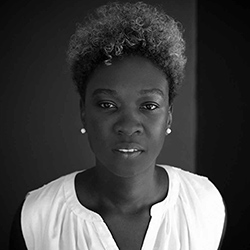allegro for shooing off the police
adagio for washing the body
scherzo for soft laughter and tears
rondo for covering the body with good earth
Antigone, dead siblings
are set.
As for the living —
pick me for a sister.
I, too, love a proper funeral.
Drag, Dig and Sisters’ Pop-Up Burial.
Landlady,
I make the rounds of graves
keeping up
my family’s
top-notch properties.
On a torture instrument
called an accordion
I stretch my bones
into fingers of a witch.
My guts have been emptied
like bellows
for the best sound.
Once we settle your brother,
I’ll show your forests
of the unburied dead.
We’ll clean the way only two sisters
can clean a house:
no bones scattered like dirty socks,
no ashes at the bottom of kneecaps.
Why bicker with husbands about dishes
when we’ve got
mountains of skulls to shine?
Labor and retribution we’ll share, not girlie secrets.
Brought up by dolls and monuments,
I have the bearings
of a horse and bitch,
I’m cement in tears.
You can spot my graves from afar,
marble like newborn skin.
Here, history comes to an end
like a movie
with rolling credits of headstones,
with nameless credits of mass graves.
Every ditch, every hill is suspect.
Pick me for a sister, Antigone.
In this suspicious land
I have a bright shovel of a face.
Notes on the Poem
We begin this week with Vazhyna Mort’s hauntingly beautiful poem, “To Antigone, A Dispatch,” from her 2021 Griffin Poetry Prize shortlisted collection, Music for the Dead and Resurrected. “There are these official historical narratives. But there is also a way of remembering through feeling emotional history — not how it was, but how it felt.” Mort says in a brief NPR interview. In that same interview, she adds that it is difficult to paraphrase a great poem. The same proves true of Mort’s entire collection, a body of work that fearlessly takes on the task of transforming historical data—hundreds of thousands of nameless lives lost at the hands of wars, occupation, and displacement—into grief. “To Antigone, A Dispatch,” places Mort within a lineage of defiant heroines, unafraid to look at History in the face, summoning the power of witches and embracing the darkness needed to speak back to darkness with a new light. Of Music for the Dead and Resurrected, the 2021 Griffin Poetry Prize judges say: “’Here, history comes to an end / like a movie / with rolling credits of headstones,’ writes Valzhyna Mort, though the history doesn't end, but takes deep and memorable residence in the music of these poems. The collection offers many different kinds of poetry: from elegies to protest poems to moments of lyric intimacy. But in all of them there's an unmistakable emotion embodied in craft, one that continues to echo in our minds long after we finish the book. And this is perhaps the reason why Mort's striking pages about Belarus are ultimately poems about all of us: they set our remembering and our grief to inimitable music.” Hear Valzhyna Mort read her poem here. Read this this interview with Valzhyna Mort in Pen America. Listen to her read her poem “A State of Light State of Light," from her collection Music for the Dead and Resurrected here. Read this review by Brian Dillon in 4Columns.





